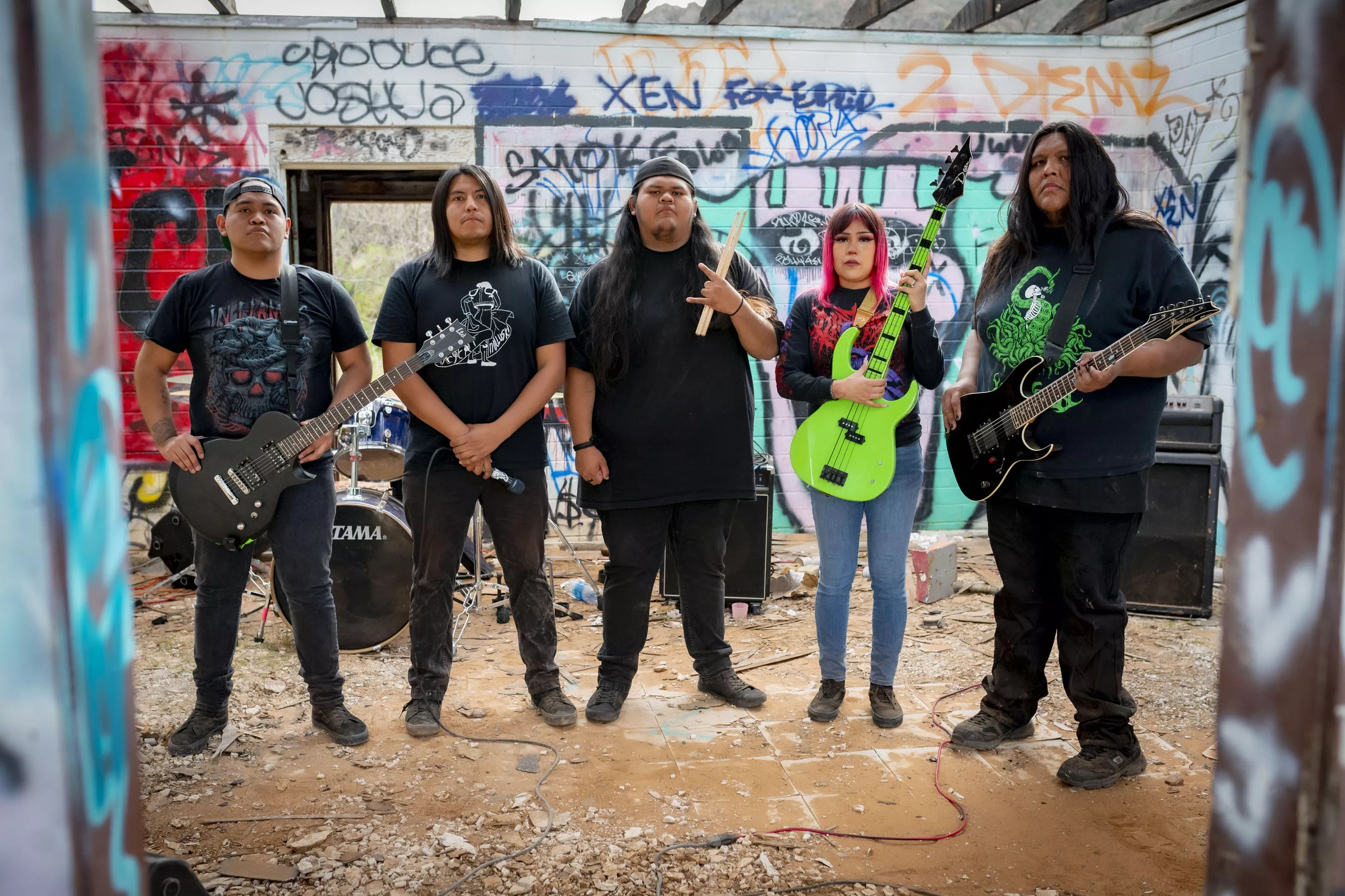
Courtesy Samantha Hunter

Audio By Carbonatix
Heavy metal has a long history of springing up in surprising places. From the 1990s Swedish death-metal movement in Gothenburg to the Pacific Northwest’s more recent Cascadian black-metal boom, regional scenes rooted in community and a shared musical ethos have made a worldwide impact. And in the Southwest, particularly on Indigenous reservations, metal has taken a stronghold. That sparked the interest of Viki Eagle in 2018.
“I always wondered what it was and why the Southwest had so many metalheads,” says Eagle, who grew up in Denver but traces her heritage to the Lakota of the northern plains of South Dakota.
There was an incident in 2018 at Colorado State University during which a prospective student’s mother called campus authorities because she was alarmed by two Native American brothers wearing metal T-shirts who were also part of the campus tour. When she heard about it, Eagle decided to study the reservation metal scene more closely.
Her research is reflected in Re(Mapping) a Rez Metal Sonic ReZistance, an installation of rez-metal band T-shirts at the Denver Art Museum that she created as the institution’s current Native Arts resident artist. But she didn’t stop there: Eagle also organized the Rez Metal festival at Levitt Pavilion on Friday, June 9. It’s the first metal fest of its kind at the nonprofit venue, and will include sets from Sage Bond, Merciless Indian Savages (whose name is a reference to a slur included in the Declaration of Independence), Alliance, Heart Museum and Suspended.
Eagle hopes the free event, as well as her DAM installation, demonstrates the importance of rez metal and Native musicians.
“I realized that people don’t really understand that there are actually a lot of Natives into metal music,” Eagle says. “I thought that this was something that needed to be seen. … I was really inspired to see Native people who love this genre and still love this genre. For Native people, it’s so deep, and it’s continuing that way within the music scene.”
Eagle is currently a doctoral student on Tongva land at UCLA’s Department of Anthropology, and her dissertation focuses on rez metal. For the DAM artist-in-residence project, she also co-directed a short documentary, “Rezistance,” with Martin Martinez.
Navajo Nation melodic-hardcore band Heart Museum is included in the film, exhibit and festival. As vocalist Toni Lee tells it, music saved him during some of the most difficult times of his life on the Shiprock, New Mexico, reservation, including a suicide attempt.
“I write a lot about my personal experience, but I try to write it in a way that’s neutral and people can relate to,” he says, adding that his lyrics cover themes of growing up without a father, accidental overdoses, survivor guilt and losing a child. “There’s no way to get past these things, but something about getting it out and making it something you can listen to and adore just feels like you’re not letting go – you’re putting it aside. It comes down to trauma.”
Most rez-metal musicians can relate to Lee’s sentiment, with music that references colonization, decolonization and ongoing systemic oppression.
Channing Concho, founding drummer of the longstanding all-female Albuquerque thrash band Suspended, calls it “genocidal trauma,” which typically manifests itself in the form of anger or hopelessness, particularly among Indigenous youth. But that’s where metal comes in.
“That’s what’s keeping them from hurting themselves or other people, because they can relate to the lyrics or how heavy a song is – because that’s how they may feel in their body, heart or mind,” she explains.
Representing the Hopi, Acoma/Laguna Pueblo and Diné Navajo Nation, Suspended also shares messages about Murdered and Missing Indigenous Women, the LGBTQ+ community, and “empowering women in general,” says Concho, who is open and honest about her past struggles with alcohol addiction.
“I think a lot of us are trying to get the word out about what we’ve been through as far as Native American people always being pushed aside, always being told, ‘That’s not how we do things,'” she adds. “We’re kind of in between that fine line of being traditional and living in the real world today. It’s really about trying to focus on who we are as people in general, but also relating to who we are as Native people, and continuing to break that mold that we’re not just brown-skinned people who always live on a reservation without running water or electricity. Because not all of us are like that or grew up that way, even though a majority of us did.”
The five members of metalcore outfit Alliance are from the San Carlos Apache Tribe in Arizona. Founding guitarist Isaiah Patterson is credited with shaping the scene there, owing to his involvement in other bands such as Unleashing the Catastrophe and Perseverance over the past ten-plus years.
“He influenced a generation,” says Alliance vocalist Scottie Noline.
Patterson laughs, remembering when metal wasn’t always approved of in their hometown. But it’s “gotten better,” he says.
The band lives at least two hours from any major city, but plays out as often as possible. Landing a show in Denver is a big deal, and it has the community talking.
“It’s like, ‘You guys really believe in us,'” Noline says. “It’s not so easy to just make things happen, but we’re still making it happen. That’s the special aspect of rez metal. We come from rural areas, but we’re going to show you what it’s all about.”
Rez Metal festival, 6 p.m. Friday, June 9, Levitt Pavilion Denver, 1380 West Florida Avenue. The show is free; VIP tickets are $35.